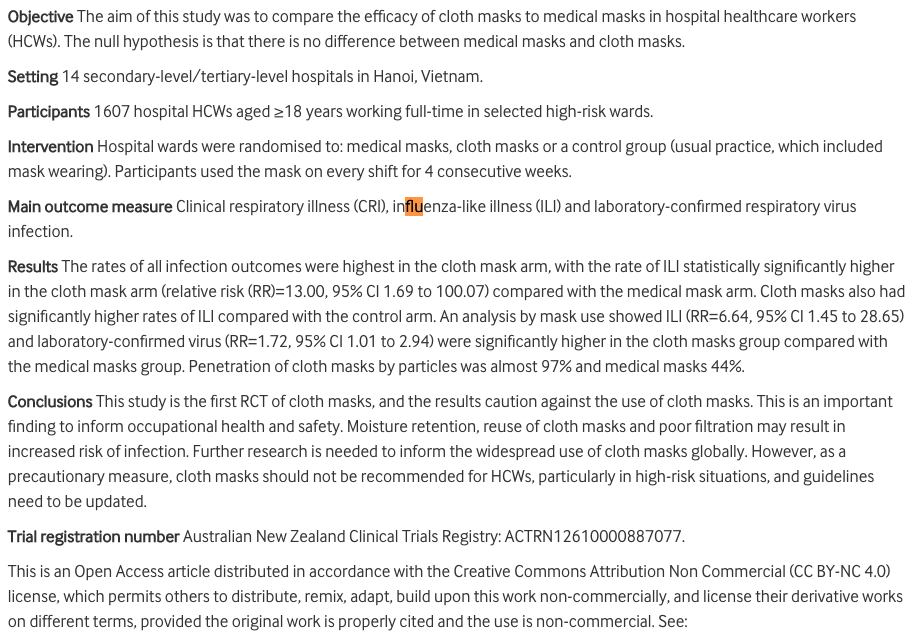The results of this study ought to be read by every mask wearer, especially those healthcare professionals and providers in clinical environments. Likewise, in-home COVID-19 caregivers should also pay heed to the results stated below.
BMJ Journals: A cluster randomised trial of cloth masks compared with medical masks in healthcare workers
From the Abstract:
Objective The aim of this study was to compare the efficacy of cloth masks to medical masks in hospital healthcare workers (HCWs). The null hypothesis is that there is no difference between medical masks and cloth masks.
Setting 14 secondary-level/tertiary-level hospitals in Hanoi, Vietnam.
Participants 1607 hospital HCWs aged ≥18 years working full-time in selected high-risk wards.
Intervention Hospital wards were randomised to: medical masks, cloth masks or a control group (usual practice, which included mask wearing). Participants used the mask on every shift for 4 consecutive weeks.
Main outcome measure Clinical respiratory illness (CRI), influenza-like illness (ILI) and laboratory-confirmed respiratory virus infection.
Results The rates of all infection outcomes were highest in the cloth mask arm, with the rate of ILI statistically significantly higher in the cloth mask arm (relative risk (RR)=13.00, 95% CI 1.69 to 100.07) compared with the medical mask arm. Cloth masks also had significantly higher rates of ILI compared with the control arm. An analysis by mask use showed ILI (RR=6.64, 95% CI 1.45 to 28.65) and laboratory-confirmed virus (RR=1.72, 95% CI 1.01 to 2.94) were significantly higher in the cloth masks group compared with the medical masks group. Penetration of cloth masks by particles was almost 97% and medical masks 44%.
Conclusions This study is the first RCT of cloth masks, and the results caution against the use of cloth masks. This is an important finding to inform occupational health and safety. Moisture retention, reuse of cloth masks and poor filtration may result in increased risk of infection. Further research is needed to inform the widespread use of cloth masks globally. However, as a precautionary measure, cloth masks should not be recommended for HCWs, particularly in high-risk situations, and guidelines need to be updated.
Editor’s Note: The efficacy of mask-wearing by the medical authorities and government officials alike has been grossly misrepresented and purposefully distorted. Hence, folks everywhere need to be aware of this important study.
State of the Nation
July 9, 2020
________
Screenshot for paper title: A cluster randomised trial of cloth masks compared with medical masks in healthcare workers

